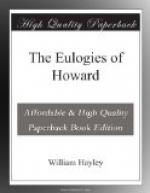THE EULOGIES OF HOWARD
It was my chance to be conversing with a Friend of the benevolent and indefatigable Howard, when our country was first afflicted with the public intelligence of his death. After our first expression of surprize and sorrow, we naturally fell into serious and affectionate reflections on the gentle character and sublime pursuits of the deceased. On these articles we had no difference of opinion; but in the course of our conversation a point arose, on which our sentiments were directly opposite, though we were equally sincere and ardent in our regret and veneration for the departed Worthy, to whom it related. I happened to speak of the public honours that, I hoped, a grateful, a generous, a magnificent Nation would render to his memory. My companion immediately exclaimed, “that every ostentatious memorial, to commemorate the virtues of his friend, would be inconsistent with the meekness and simplicity of the man; that all, who had the happiness of knowing Howard, must recollect with what genuine modesty he had ever retired from the enthusiastic admiration of those, who had hoped to gratify his ambition by undeserved applause; that he had really sought no reward but in the approbation of his conscience and his god; that the British Nation, however eminent for genius and munificence, could not devise any posthumous honours, or raise any monument, truly worthy of Howard, except in adopting and accomplishing those benevolent projects which his philanthropy and experience had recommended to public attention for the benefit of mankind.”
I readily admitted the singular and unquestionable modesty of the deceased.—I allowed that the noblest tribute of respect, which the world could render to so pure a spirit, would be to realize his ideas; but I contended, that other honours are still due to his name; that it is the duty and the interest of mankind to commemorate his character with the fondest veneration. I reminded my companion, that although we were sincerely convinced that no human mind, engaged in great designs, could be more truly modest than that of Howard; yet we had particular reason to recollect, that he was not insensible to praise. He had once imparted to us his feelings on that subject with a frank and tender simplicity, highly graceful in an upright and magnanimous being, conscious of no sentiment that he could wish to conceal. Indeed, a sincere and ardent passion for virtue could hardly subsist with a disdain of true glory, which is nothing more than the proper testimony of intelligent and honed admiration to the existence of merit: nor is it reasonable to suppose that the fondest expressions of remembrance from a world, which he has served and enlightened, can be displeasing to the spirit of “a just man made perfect;” since we are taught by Religion, that the gratitude of mankind is acceptable even to god. I endeavoured to convince my companion, that, as the Publick had seen in Howard a person who reflected more genuine honour on our country than any of her Philosophers, her Poets, her Orators, her Heroes, or Divines, it is incumbent on the Nation to consult her own glory by commemorating, in the fullest manner, his beneficent exertions, and by establishing the dignity of his unrivaled virtue.




